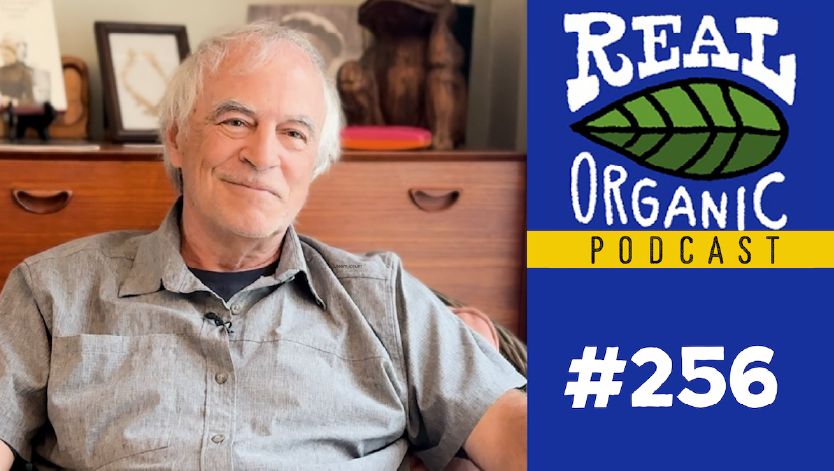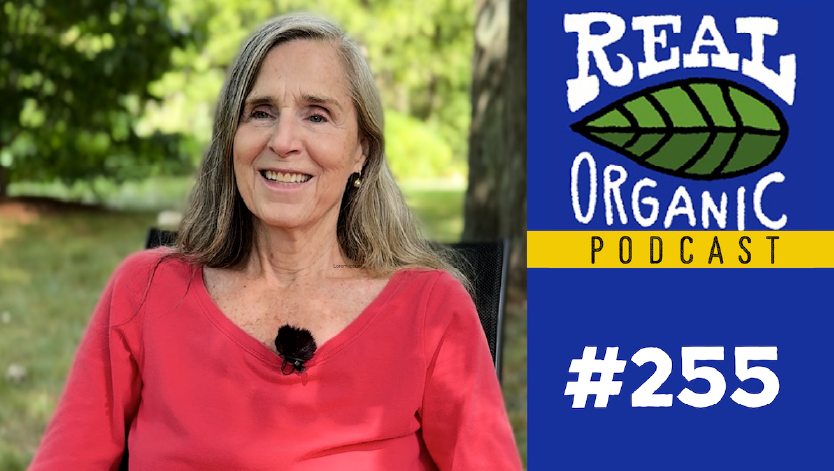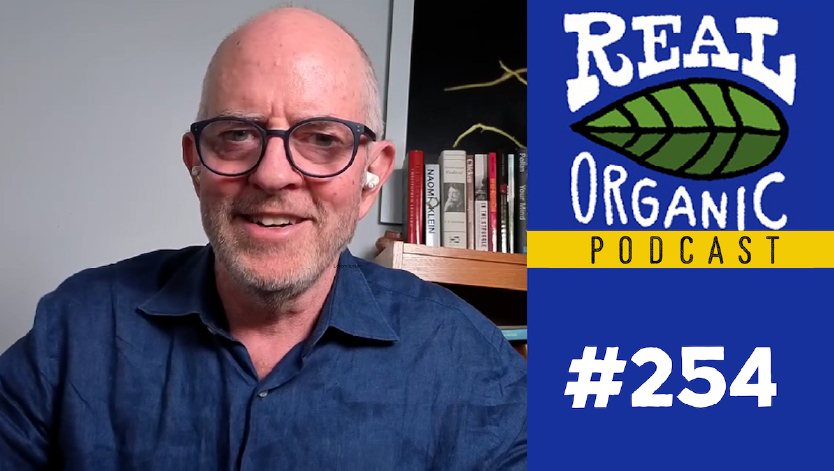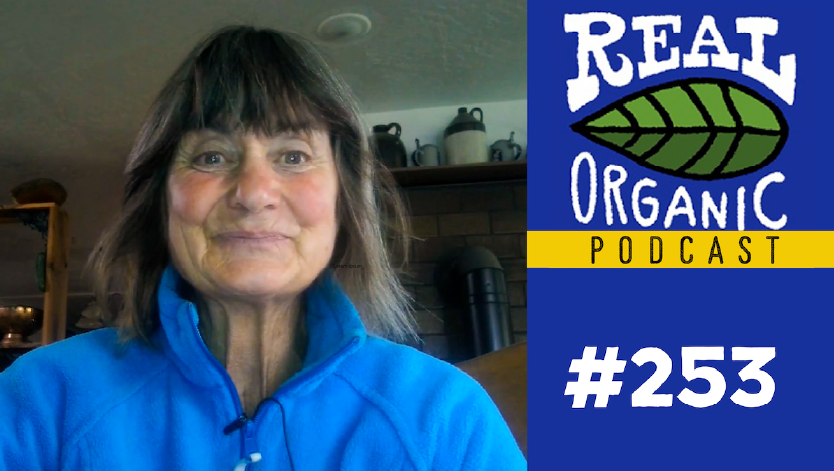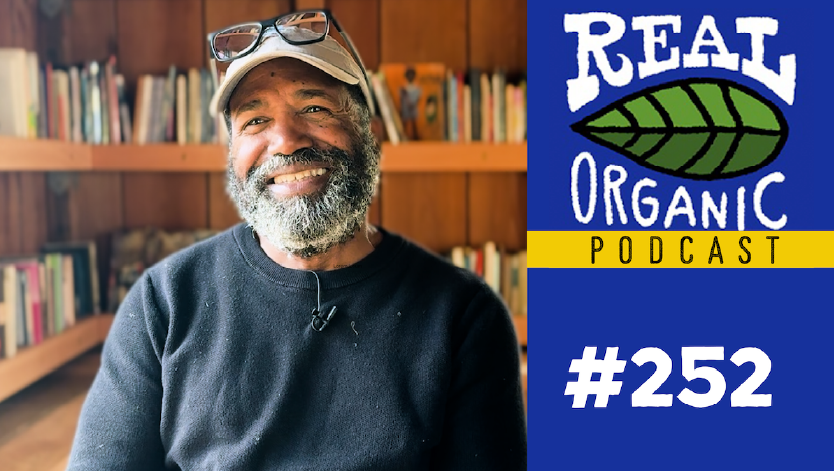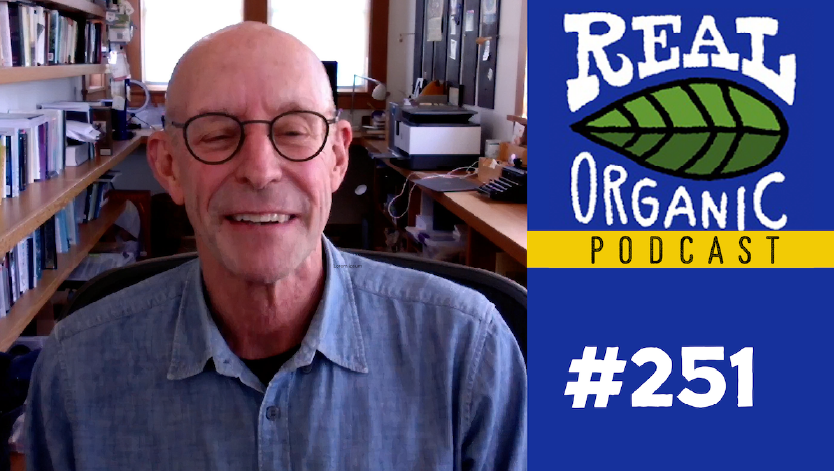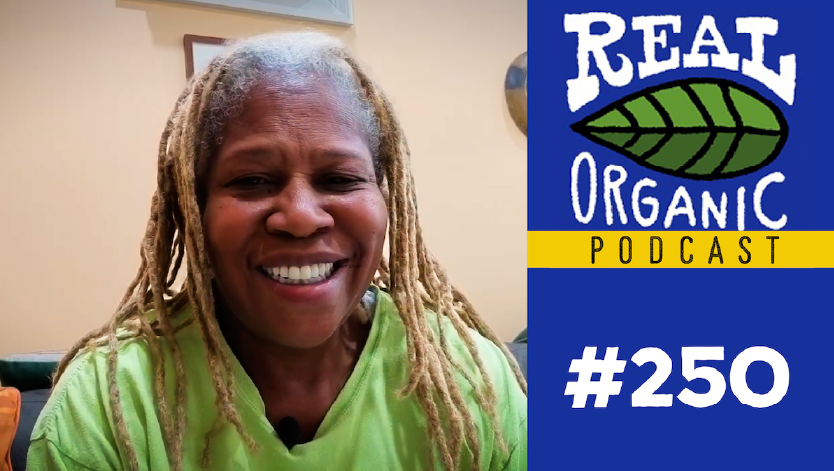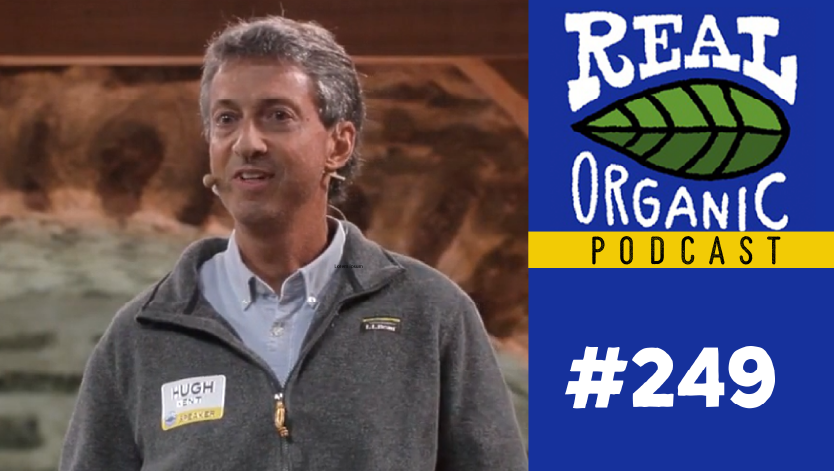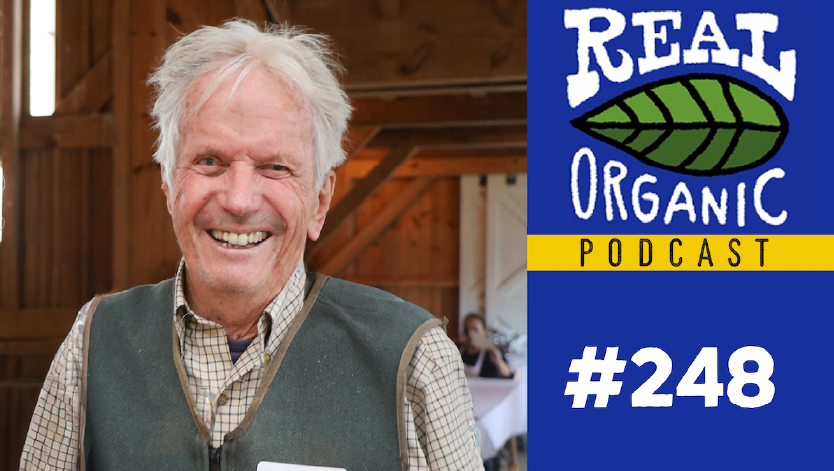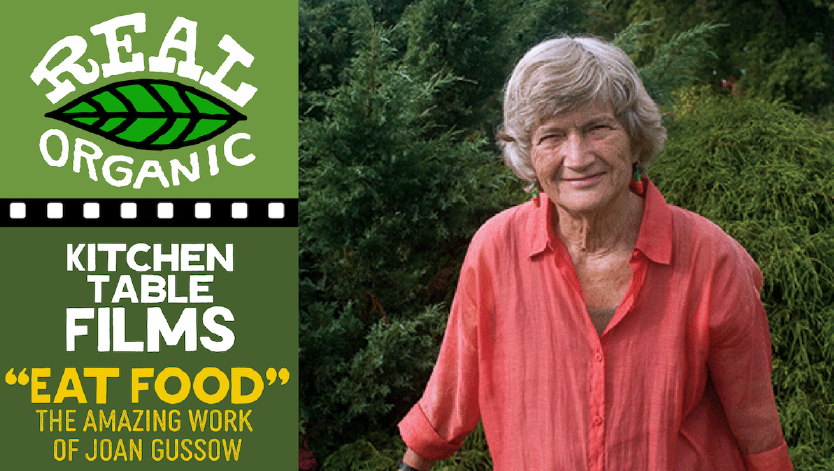Episode #169
Barbara Gemmill-Herren: Big Chem’s Eyes Are On Africa
Welcome! You can subscribe and download episodes of our show through your favorite podcast app.
You can also subscribe to receive the video version of each episode on our YouTube channel.
Our Barbara Gemmill-Herren interview has been edited and condensed for clarity.
Dave Chapman interviews Barbara Gemmill-Herren, January 2024:
Dave Chapman 0:00
Welcome to The Real Organic Podcast. I’m talking today with Barbara Gemmill-Herren. Barbara, you have a lot of stuff that we’ll put into the program notes that you’ve done, you know, really an amazing career, but I’m just going to shorten it to say that you still teach at Prescott College down in Arizona. My cousin was involved with founding Prescott.
Barbara Gemmill-Herren 0:29
Oh really?
Dave Chapman 0:29
Long time ago, really.
Barbara Gemmill-Herren 0:30
In the 60s.
Dave Chapman 0:31
Yeah, yeah. And you had a career for the FAO at the UN. And lots of other stuff. So, tell me about how you came to agriculture, we’ll start there.
Barbara Gemmill-Herren 0:46
I’m an ecologist, I really am more of an ecologist than an agriculturalists. I did my PhD at Davis, I went to Berkeley first and have a degree in Rorestry and Range management. So, always looking at the practical side of natural resources and nature. And then I did my PhD at Davis, and during that time, we had moved to Africa so I focused on ecology and forestry: looking at how farmers have practices to conserve the forest when they need to clear it for agriculture. We were on a research station, we were talking earlier about these big CG, we agricultural research stations. At that time, they believed that you need to use tractors and tree pushers and go and clear cut the forest. And the farmers themselves were really conserving certain trees to allow the forest to grow back quickly with the fallow. So I was documenting the regrowth and the and the yields during that time. And it was, you know, compared to this multimillion dollar project to clear the forest, what the farmers were doing made a lot of sense, and we could show that. But subsequent to that, forestry research takes years! You really have to be in it for the long haul, and I became really interested in pollination as an ecological process that’s really important to natural resource management. And it’s right there in front of you, you can just see it happening. And it’s so interesting.
So I got very interested in it. At the time, we were living in Kenya – I’d finished my PhD – and I had an appointment at University of Nairobi, and working with postgraduate students on pollination, I could raise some funds for research and looking at both in the dryland, the range land, and in the agricultural area. Again, sort of similar, where there’s an area of Kenya near to Nairobi, where the farmers are under a lot of pressure to clear cut these riverine forests, because they can grow a lot of vegetables for export to, the UK – eggplant and other sorts of Asian vegetables. But, even they realized, actually, they didn’t know a lot about pollination, because it’s not something that’s necessarily a lot in traditional knowledge. They know of it in a holistic way, but not to really see what a bee does, it’s something you have to pay attention to. And that was interesting to look at it with them; they got interested and started following these bees around to see how interesting it was.
But, they realized that they needed to conserve some of that forest because that’s where the bees go to nest during the dry season, and how important it is to have a mixture between agriculture and natural areas to conserve the sustainability. So, I worked with many partners in Kenya, and then several partners, we set up a kind of network in South Africa, Ghana, Kenya particularly, and started this African pollinator initiative. At that time, the global community in the Convention on Biodiversity was recognizing the importance of agricultural biodiversity, which wasn’t a part of the mandate of the Convention on on biodiversity when it first set out. But a number of developing countries said: if you want to make this relevant to us, you’ve got to consider agricultural biodiversity. It has to be really relevant to our livelihoods. And so they did adopt a program, and they particularly pinpointed crop biodiversity, which is all the genetic seeds and livestock diversity that’s important, but also soil biodiversity and pollination.
Barbara Gemmill-Herren 0:49
Let me ask – I’m just curious. So when you said they weren’t looking at agricultural biodiversity, this was a government program, an academic program to look at biodiversity in a natural system?
Barbara Gemmill-Herren 4:42
It wasn’t a government program. It’s an inter-governmental program. It’s the United Nations. When the members of the Convention on Biodiversity get together, which they do every two years, they set priorities that they then ask all their member countries to listen to and develop programs to conserve. So endangered species, forests, various topics that had come up and the countries that adopted programs to conserve their forests were not always effective, but at least it’s a global recognition of how important these things are. And agricultural biodiversity wasn’t a part of that to begin with. So this is in a discussion among member countries.
Dave Chapman 5:23
I’m just curious where this came from. This was from a group of ecologists who said, we’re getting concerned about the destruction of nature and the subsequent loss of biodiversity?
Barbara Gemmill-Herren 5:33
Yeah, I suppose the pressure came from that and from citizen groups, but it came out of the very first Earth Summit in was it 1992? where a lot of the UN initiatives and the Convention on Biodiversity, and Convention on Desertification came from. So, it’s been around for a long time and it was probably a lot of scientists, but it was also a lot of – certainly with agricultural biodiversity – it’s been a lot of grassroots groups which have said this is really important. More than their own government may recognize, so it has been a way for them to pressure their own governments.
Dave Chapman 6:09
Yeah, I can imagine that governments are often not considering this to be significant. They’re looking at a much shorter timescale.
Barbara Gemmill-Herren 6:17
Exactly. Yeah. So from there, the UN Convention on Biodiversity, asked the FAO, the Food and Agriculture Organization, to develop a program on pollination, and they asked me to coordinate that. So I moved from Kenya to Rome, and coordinated that program – I was there for 11 years.
Dave Chapman 6:36
In Rome?
Barbara Gemmill-Herren 6:37
Yeah.
Dave Chapman 6:37
Wow.
Barbara Gemmill-Herren 6:38
Yeah. It started out on pollination, and working specifically in Nepal, Brazil, Pakistan, India, Kenya, Ghana, and then South Africa. But over time, and working with my fantastic partners in these countries, we could do a lot of things. We could help farmers to realize the importance of pollination, addressing pesticide policy, and various things that impact pollinators. But at the end of the day, farmers don’t just manage pollination, it’s holistic. They manage the whole system and they wouldn’t do just one thing for pollination, it has to fit into their farming system. So we really focused on more holistic approaches like agroecology. At the time, when I first came to FAO, you couldn’t even talk about agroecology. It was sort of verboten and there were a number of countries which were really opposed to it. But we had an executive Director General that was from Brazil, and Brazilians understand agroecology. He was very political – he understood conventional agriculture and agroecology. So, he actually brought us into his office and said: Go for it, I’m going to open the door for you to really pursue this, this is something that could be on the agenda. We would be advising governments to go down this route, where we have been telling them not to.
Dave Chapman 7:58
So, probably most people in America, certainly most people outside of academia, don’t know much about agroecology, It’s much bigger in the rest of the world.
Barbara Gemmill-Herren 8:10
It is. It really developed out of indigenous practices in many countries. India has a long history of composting and how to work with nature to sustain produciton. Brazil has a long history in agroecological practices. We didn’t want to say: Oh, I’v just discovered agroecology. Because we didn’t, it’s very vibrant in many parts of the world. We could have a couple of symposiums where we would invite people to come to it. And they were completely unlike other symposiums at FAO, because we had all these dynamic women from West Africa. People would stand up and clap, which you don’t do in a UN meeting, so it was fun! But we were asked, the first thing that member countries ask you is: what is agroecology? We were kind of reluctant to come up with it a definition, it’s always so difficult. I’m sure you get into this a bit with Real Organics and Organics. Like, are you saying what’s in and what’s out? Where do you draw the line on some things which are on a gradient, that you need to maybe encourage to progress along that gradient?
Dave Chapman 8:10
Yeah. It was interesting. Of course, Organic came from the agroecology of India directly.
Barbara Gemmill-Herren 9:26
Yeah.
Dave Chapman 9:34
Howard brought it back to England and from there, it went out to Europe and into the United States, and then back to India, which is kind of a fascinating loop. But, the idea of defining it, in terms of whether this practice or that practice, or this material or that material – I think there was considerable doubt amongst the organic pioneers if that was possible,
Barbara Gemmill-Herren 10:02
Yeah.
Dave Chapman 10:04
I think Howard, and Heath Balfour, both didn’t think it was possible, even though I think Heath Balfour’s work kind of led directly to the Soil Association and the first standards.
Barbara Gemmill-Herren 10:17
Yeah.
Dave Chapman 10:17
So, there were reasons for defining it as it turns out.
Barbara Gemmil-Herren 10:20
Yeah.
Dave Chapman 10:21
And and there was an understanding that we’ll never get it exactly right, but we can get it approximately right in a way that’s very valuable.
Barbara Gemmill-Herren 10:31
Yeah. And, as standards, which often are aspirational whether you’re actually there. But we, we ended up at FAO, and a lot of agroecology pioneers have also talked more or less about principles rather than, than criteria. So we did work with a big group of people, a big consultation, to identify 10 principles of agroecology. I think that’s been really helpful, because it’s been to say that it’s you can’t cherry pick, you can’t just pick this practice or that practice, you need to have these all together. And five of them are biological, physical, or biological, and five of them are social. And it’s the social ones that many governments just cringe at: they just don’t really want to deal with equity and justice issues. But if you remove that, you’re not dealing with agro-ecology. So, I think it’s been very helpful to have an integrated set of principles.
Dave Chapman 11:26
When I talked with Miguel Alterie about this, he said that he was describing those principles. And I said, Well, Miguel, that’s all organic. I mean, we were the same. He said, yes, but politically, we’re not.
Barbara Gemmil-Herren 11:39
Yeah.
Dave Chapman 11:40
And I said, oh good, let’s talk about that. Because actually, Real Organic, is, in my mind, returning to the roots of the Organic movement, which was about political stuff to, for sure. So, could you talk about what those biological principles – go ahead.
Barbara Gemmill-Herren 11:58
Well, that they’re ones that I think everyone knows pretty well. I don’t have the list with me right now, but it’s basically about recycling, using pest control, measures that respect nature, biological control, crop diversity, all around diversity in the system. And using nature in every way that you can, I think we don’t even know how much nature can help us. We’re just learning about it now, underground and above ground. So those are ones that I think are very much taken up in organic principles as well. The more social ones are – organic, and Real Organic have paid attention to this for sure – food, traditions, circular economies, justice, and system justice in agriculture.
There’s two others which will come to me soon, but it’s really around those whole issues of equity, justice, and respect for Indigenous populations and knowledge. One of them is around forms of knowledge – it’s respecting the diversity and forms of knowledge, which I think is a really key one. Some of the things we’ve been able to do, I was sort of put out to pasture by FAO at the age of 62 because that’s the UN’s retirement age, which seems quite young *laughs*, but they recycle you. So you know, they brought me back as a consultant for some sub-committes. One of them that I really liked a lot was developing – they haven’t really used it yet – but developing a guidebook to farmer researcher initiatives, respecting farmers as researchers, because they’re researching all the time, and so people should respect them. If researchers want to develop research agendas, ask the farmers first, rather than developing their agenda and then going to the farmers and telling them what they need to do. Because that form of knowledge is really formidable, and it’s very place-based. If you’ve talked to many farmers in the same place, they’re dealing with the same issues, but they haven’t really been encouraged to share their knowledge or to have their knowledge respected.
Dave Chapman 13:30
Yeah. As part of it, is there any conversation about decentralizing power? Decentralizing the economy, as opposed to consolidating, which is the major trend we see in everything, but certainly in all agriculture in the whole food system?
Barbara Gemmill-Herren 14:24
Yeah. I mean, circular economies, trying to develop ways that things stay within a region, is part of that. I think there may be more – I haven’t looked at it recently, where you could pull that more out – but that definitely is the one that governments don’t want to emphasize too much. Yeah, but it’s a really, really valid one. It’s interesting to see where people have gained some traction with that.
Dave Chapman 14:48
Yeah, when we when I started in all this, I really thought we were talking about a small regulatory failure in the USDA.
Barbara Gemmill-Herren 14:59
Yeah,
Dave Chapman 14:59
And I have discovered that we’re actually talking about democracy, and we’re talking about the consolidation of power into the hands of a few. And they use that power to rewrite the rules.
Barbara Gemmill-Herren 15:11
Yeah.
Dave Chapman 15:12
It got so much bigger than I anticipated.
Barbara Gemmil-Herren 15:16
Yeah
Dave Chapman 15:16
But here we are.
Barbara Gemmill-Herren 15:17
Yeah, here we are.
Dave Chapman 15:18
*laughs*
Barbara Gemmill-Herren 15:19
But on the other hand, I think the a lot of the consolidation comes from the input companies. We know, we lived 25 years in Africa, we know how they’re everywhere, and able to, you know, convince farmers to take the money that save for school fees, but end up paying it for inputs. But, the agroecological alternative is, as we talked about with bio-control, is a sustainable alternative to that, that doesn’t have to involve a lot of cash exchanges. Now, it’s a way of working. So the ammunition on the other side, if it’s allowed, I think can be quite tremendous.
Dave Chapman 16:00
What do you mean by that?
Barbara Gemmil-Herren 16:00
To be able to use natural processes rather than be using purchased inputs
Dave Chapman 16:04
Yeah. So, let’s talk about you said, Well, of course we know what’s happening in Africa. But of course, most of the people listening to this don’t know what’s happening in Africa. I’ve never been to Africa, and I know now, a few African farmers, through this connected world of ours. But could you tell us what is happening in Africa? It’s a big place.
Barbara Gemmill-Herren 16:32
I mean, I wouldn’t be the spokesperson to speak. I think you’ve interviewed Million Belay –
Dave Chapman 16:37
From your experience.
Barbara Gemmill-Herren 16:39
Yeah, no, but there are some people who really have got some incredible networks among farmers.
Dave Chapman 16:43
I will try and search them out in the future. But from your experience right now-
Barbara Gemmill-Herren 16:48
Yeah. So, I can speak most – I’ve worked a lot in the field in in Kenya and Ghana, I would say. There’s a lot of issues with farmers really having declining productivity, the more they’ve put in inputs, the less they’re getting out of it. And then the farmers, the farms are becoming smaller and smaller. So there’s a lot of tension in agriculture.
Dave Chapman 17:13
When you say putting in inputs, not everybody knows what that means.
Barbara Gemmill-Herren 17:17
Okay, sorry. External inputs include chemical fertilizers and pesticides. The pesticides are the ones that concerned me the most; certainly, from the standpoint of how it impacts pollinators. It also preys so much on the anxiety of farmers, that they’re going to lose their whole crop if they don’t spray more pesticides. So the marketing is quite strong to farmers. But there are some really excellent initiatives that have worked with community groups, and farmers who have taken matters more into their own hands. And I see them as sort of lighthouses that really provide a lot of hope, and example to farmers. And you can find quite a few of these. The battle is not at all lost. I think it’s really one that can go in the right direction. But at the same time, you’ve got a lot of imports, a lot of people are moving to the cities, depending more on imported food. There is less dependence on on beans, which is a real mainstay of of nutrition and restoring soil fertility. So you’ve got another dynamic to deal with, with greater urbanization.
Dave Chapman 17:17
Okay, use the language: this is a battle that we could still win.
Barbara Gemmil-Herren 18:30
Yeah.
Dave Chapman 18:31
That’s the language that Tim Wise used last week – his book is talking about the battle for the future of food.
Barbara Gemmill-Herren 18:38
Yeah.
Dave Chapman 18:39
Can you tell me what that looks like to you? Who are we fighting against? How did this get to be a battle?
Barbara Gemmill-Herren 18:47
The more that you can get work with farmers and farmer communities, the more that they can build their own structures. It’s not a battle then – I mean, they’re really building their own strength. I have a good colleague who was part of our agroecology symposium in Zimbabwe, who did some really nice research showing that the more you have the platforms where farmers are sharing information among themselves, the stronger that is, and also the more they’re able to increase their incomes, and be able to have more outreach to their communities, and set up more social welfare structures. So, defeating the conventional trend to not have farmers talk to each other and to network with each other – I think that used to more in the past – but the more that you find ways that they are able to build their own networks, I think, that really can strengthen how they would go forward.
And it’s hard. I think it’s very hard. I have a colleague of mine who now runs, I think, the largest Organic market in Nairobi. And he’s not very fond of certification, because certification is prone to a lot of corruption in Kenya. He himself is an Organic farmer, and he doesn’t sort of himself, because he says the certifiers only asked him to pay a large amount of money each year and never came to his farm, and really weren’t trying to move this forward. So, he’s not keen on certification. The farmers in the Organic market tend to say we are Organic, but they’re not, there’s no real proof of that. There’s suspicion among the people who buy there. I was speaking with him a little bit about participatory guarantee schemes, which, I don’t know if you’ve interacted with them, but I find them really interesting because it’s peer certification. It means that they have to cooperate with each other and my colleagues said: oh, these farmers here in this market, they’re very suspicious of each other. Also, they don’t tend not to help each other. But if that was part building their network and the way that they outreach to improve their standing within the community, I think that could be quite strong.
Barbara Gemmill-Herren 20:04
Yeah. Of course, that’s how it used to be here.
Dave Chapman 20:58
I was just talking to Judith this morning, and when Organic certification began in California by CCOF, which they had started –
Barbara Gemmill-Herren 21:10
Yeah.
Dave Chapman 21:10
It was farmers inspecting farmer.
Barbara Gemmil-Herren 21:12
Yeah, yeah.
Dave Chapman 21:15
You know, and I know that there are problems with that, but I also know there are problems with the alternatives.
Barbara Gemmill-Herren 21:20
Yeah.
Dave Chapman 21:21
So, we try and figure out what might work the best.
Barbara Gemmil-Herren 21:25
And with with Real oOganic, it is pure certifications.
Dave Chapman 21:29
No, we have – we don’t inspect; so, people go through their USDA inspection. And then we actually do an on site inspection at least once every five year, and they do an annual update on their paperwork. That’s done by a paid staff.
Barbara Gemmill-Herren 21:48
Yeah. Okay.
Dave Chapman 21:49
Although they’re, they’re wonderful. They understand farming, they’re very committed, and they travel around. People are usually pretty happy to see them.
Barbara Gemmill-Herren 22:00
Yeah. That’s great.
Dave Chapman 22:01
It’s not like the sometimes degrading experience….
Barbara Gemmill-Herren 22:04
Yes.
Dave Chapman 22:07
Yeah. So, good! So, in Africa, there a lot of chemicals being used?
Barbara Gemmill-Herren 22:17
That was the other part I would say is that, yes. And a lot of people say Oh, smallholder farmers in Africa, they’re a defacto Organic: they’re not. I mean, they have a lot of pressure on them to use chemicals. And this fear factor.
Dave Chapman 22:30
And where does that pressure come from?
Barbara Gemmill-Herren 22:32
From the salesman.So the salesman are out theyre out there in the smallest community, and they will say youu can lose your crop completely. And the pesticides are called…they have all these words like, Samson, you know, strong man kind of words are the title of the pesticides. So they they get quite influenced by that, they don’t want to lose their whole crop and it’s a rather small farm, right. So it takes a lot to stand up against that.
Dave Chapman 23:01
I’m just curious how it got so strong. Was this just market capitalism at work? Or was this game being rigged in some way? Is there government support for those companies that are selling chemicals?
Barbara Gemmill-Herren 23:20
I don’t actually know for sure. I kind of think there might be, but I think the companies themselves, the Yara and the pesticide companies, they’ve turned to Africa as there next big frontier. They really see that as where they’re going to get recurrent customers buying every year. They’re focusing a lot of their marketing on Africa. Now, my organization – FAO -there’s been a lot of publicity lately about locust control in Africa. When locusts build up their population they swarm, and then they can be extremely devastating to fields. Unfortunately, FAO has been really roundly criticized because they work with the government quite a bit, they provide pesticides for the government to spray against the locusts.
Most of those chemicals don’t go to the locusts, they’re sold on the market. There’s government officials who can make money off of it, and they’re very toxic pesticides – ones which are banned in Europe often – and they should not be there at all to begin with. There’s a good article that just came out in Grist just a couple of days ago and there’s photographs of young teenagers mixing with chemicals with their hands which they should not be doing at all. There is definitely government involvement, when pesticides go through the government they can sell it on the open market. Corrupt individuals in the in the government can sell it and make money from it. And that’s happened all over Africa.
Dave Chapman 24:54
Yeah, It’s a little bit the Wild West.
Barbara Gemmill-Herren 24:57
Yeah, no, so unfortunate. Really
Dave Chapman 25:00
And I have to ask: what about the Green Revolution coming to Africa?
Barbara Gemmill-Herren 25:05
It’s not been a success at all. And I think early on the the Green Revolution is linked to this CG system that we’ve talked about that began in Summit in Mexico with miracle wheat and miracle maize and miracle rice in Erie. And the thought was that you could replicate this somehow in Africa. But it really has not worked out. I think there’s been an early realization that intensifying agriculture in Africa just doesn’t work. It just doesn’t work. You’ve got many many smallholders, and even when people have been able to buy large farms, it has not turned out to be sustainable. So they did set up a couple of centers in Africa that were meant to be looking at the system rather than a particular crop. The one that Hans and I were both stationed in, IITA, the International Institute of Tropical Agriculture, was meant to be a systems approach. But there’s not a lot of – the people that came there were agronomists, they weren’t really trained in, say, social studies.
I mean, I remember I was doing my work with with farmers on their practices about conserving trees, and the social scientists from IITA would go up to the fence and watch the farmers outside of the fence rather than talking to them. They just weren’t accustomed to working with people. So they haven’t shown a lot of strength in taking a social approach. There IITA and there’s SIOT in Colombia. But I wouldn’t say that they’re the real bright lights in taking a social lens on how you can support a more sustainable agriculture. It simply hasn’t worked. There is a very good study that looked at over 116 countries, over a 25 year range, looking at what were the practices introduced that did the most to address hunger, since hunger is basically what we’re talking about here. And out of that study, they found that the number one measure was water and sanitation. It wasn’t miracle seeds, fertilizer, anything like that. The number one was water and sanitation, people having access to good water and good sanitation. And the second one was female empowerment. And both of those are social entities that need to be provided by local governments or local institutions. So why are we spending so much money on miracle seeds when actually the solutions are somewhere else?
Dave Chapman 27:41
Tim Wise suggested that even in the places where green revolution has been more successful, it was the bringing of irrigation systems, not the chemicals, not the seeds. Yeah, things do grow much better if you have access to reliable water.
Barbara Gemmill-Herren 27:57
But it’s also people’s attitude and their feeling about what they’re doing. So we had- when I was on the – after I left FAO, then it was sort of taken up and it was taken up by this committee on world food security, which is a really good committee, it’s through many agencies. They identify certain areas they should explore more, so they chose agroecology as their focal area. The countries who were opposed to agroecology insisted that it be agroecology and other innovations. There was a panel of 10 of us on this high level panel. And it was totally pro-bono, but we had a little bit of funding to fund studies that would supplement what we were doing. So I was coordinating a study on food sovereignty, and food security. Food sovereignty means that people have choices over what they can do, what kind of food they’re going to eat, what kind of food they’re going to grow, that they have, it’s a question of the power and how they have that in their hands versus having it being told to them. We could show it was a meta analysis, researching all sorts of documents, but that that just food security programs without a food sovereignty emphasis or support were not successful. Food sovereignty needed to be a part of it.
Dave Chapman 29:17
So if it was just food security, meaning that you have, again, basically a system where you feel confident that you’ll eat tomorrow as well as today.
Barbara Gemmill-Herren 29:27
Yeah, or that you’re increasing yields, which doesn’t necessarily mean that goes to address hunger, but you have greater yield.
Dave Chapman 29:34
Okay, that isn’t quite food security is it?
Barbara Gemmill-Herren 29:37
No it isn’t. But it’s often taken as food security, but that’s not quite right.
Dave Chapman 29:41
It’s assumed it is. Let’s look at that assumption. What does that mean? Greater yields? Why isn’t that food security? It seems like great, we’re growing more food.
Barbara Gemmill-Herren 29:53
Yeah, it would seem like that, but greater yeilds means, probably, it means that larger farmers are able to consolidate and use some measures to produce things more intensely. And that doesn’t go to the local community, that goes out to market somewhere. So it’s not the community, necessarily, that benefits. We did a study in Senegal about rice, and the investors who wanted to come in and fund these big schemes of irrigation schemes with really intensive rice to address food security in Senegal – Senegal really depends on imported rice a lot – and the alternative to that would be to have small, community run schemes. I mean, you still need irrigation with rice, but to have community run mills where the byproducts could go to feed animals, and people would be selling within their community. That would address food security. But simply having intensive rice production is not a direct link to food security.
Dave Chapman 30:52
Because it might be that that food just gets exported and the money gets exported from the community.
Barbara Gemmill-Herren 31:01
Yeah, exactly.
Dave Chapman 31:02
Yeah, everything becomes an export.
Barbara Gemmill-Herren 31:03
Yeah. So those are the circular economies that you want to try and find ways to support.
Dave Chapman 31:10
These are big challenges
Barbara Gemmill-Herren 31:11
They are, they are big challenges.
Dave Chapman 31:16
I see it as a battle. So, you said all is not lost, that you have seen successes in creating an alternative to that exported consolidation of money and power? So could you talk a little bit about that? What does that look like?
Barbara Gemmill-Herren 31:38
I mean, a lot of the successes become very, I wouldn’t say personal, but I do believe that in every farming community, you always find these incredible, innovative farmers who know how to work with the system. And they know nature, they know how to appreciate it, and they’re able to find ways that are not the conventional way. So being able to, to find them, support them, help them to become teachers to more of the community – where I’ve seen that happen it’s been quite dramatic, I think. We talked a little bit about Nepal, and there’s a farmer in the area I worked on in Nepal who an organic farmer where there weren’t many. I think there are more now, but there weren’t many organic farmers at the time. And he was sort of laughed at by his community, and he eventually set up a network, but it was all women, there were no men that would come over to his group. He absolutely loved nature, he wrote all the names of birds on the side of the wall of his house, and he had all these interesting kind of ways of doing things. He had vermiculture, but he had a lot of mongeese who would go in and eat all of his worms at nighttime. So he set up a moat around his worms and use that water to irrigate his plants, and he was just wonderful. He’s now a major, – set up a marketing structure where the organic food is sold in Katmandu, and has brought in many farmers from many different places, but still following his small model. And he’s such an inspiration, you know, to talk to him, and he has men too, it’s not just women, we’re following him.
Dave Chapman 33:13
And it works.
Barbara Gemmill-Herren 33:14
And it works. When people see that, you know, farmers, they know when something works. We’ve had a long history in agriculture of having demonstration sites, which tend to be really sterile. It tends to be – the University of California has a number of demonstration farms and the International Agricultural Research will have these days when they invite people to come for demonstrations, and it just doesn’t. I don’t think it convinces too many people because you need to see farmers and families and how their their children are interacting with the whole system and, you know, more more vibrant forms of demonstration.
Dave Chapman 33:51
So one of the farmers that Tim Wise talked to, I think in Africa, said they call it Climate Smart Agriculture. I call it climate dumb agriculture.
Barbara Gemmill-Herren 34:04
I do too.
Dave Chapman 34:05
So can we talk about why that is? This is so confusing, isn’t it Barbara?
Barbara Gemmill-Herren 34:12
It is very confusing.
Dave Chapman 34:13
We see these people who are very smart, and they come up with these varied systems with many, many people working on them. And we look at it and it kind of works. And then it also really kind of doesn’t work.
Barbara Gemmill-Herren 34:26
Yeah, it’s very much in the model of – so, this was kind of an alternative, maybe, I don’t know when the verbiage came out. But, you know, FAO has promoted Climate Smart Agriculture. At the same time, they’re promoting agroecology, and we’ve had a few in depth kind of considerations of how they differ – it’s pretty clear how they differ. The Climate Smart Ag is very much about the physical and biological side of agriculture, and not addressing the social side. You can give lip service to things and that’s what’s unfortunate, but it really basically doesn’t. But it has gotten a lot of support and a lot of governments have picked it up as kind of a moniker. This is confusing to governments. It’s confusing when you have people promoting sustainable intensification, and Climate Smart Agriculture, and agroecology altogether. It’s done on purpose to efusigate. The the social elements and the biophysical elements need to be taken together, and Climate Smart Agriculture does not do that.
Dave Chapman 34:35
Do you think the Climate Smart Agriculture could be successful in being a positive impact on climate or will it fail at that also?
Barbara Gemmill-Herren 35:50
Oh yeah, that’s a good question. So the aim is, I think it’s twofold. It’s adaptation, mitigation and resilience. But I think adaptation – yes? I mean, I think that’s good that they’re addressing how farmers can try to adapt to climate change, and it’s really an important consideration. But in terms of mitigation, there’s been a lot that’s been sold that I don’t think really bears up under the pressure. And, you know, there’s been a lot of airline companies, which have been investing in Climate Smart Agriculture to offset their emissions, and that just doesn’t make sense. You do not offset emissions, you do not continue to pollute and offset the emissions with measures in agriculture. You need to stop polluting, basically.
Dave Chapman 36:34
Right. I get that, that flight is not carbon neutral. But my question is, the agriculture that they are supporting, is it sequestering carbon? Is it doing the real thing? Or not?
Barbara Gemmill-Herren 36:52
I think we don’t know that very well. We need a lot more understanding of that. I’m not really so sure. I mean, if you have agriculture that is putting more carbon in the soil, that’s a good thing. But then you’re also taking a lot of carbon out of the soil with annual crops each year. And it’s not a very stable system. It’s very good if you add on carbon – I’m sure you’re increasing the health of those soils, but you’re not building up a real repository that is going to offset emissions. Agriculture is inherently unstable. Maybe with forests and agroforestry you have more of a chance of doing that? I would love to see more work on agroforestry systems because I think they have they have a lot of benefits for people, the soil, and so forth. But Climate Smart Agriculture is not solely focused on agroforestry by any means.
Dave Chapman 37:48
Right. Well, now, it as the US government is funding, it seems to involve a fair amount of herbicides.
Barbara Gemmill-Herren 37:58
Yeah, it does. That’s something that’s really considered quite okay within the system is conservation agriculture, which is basically using a lot of herbicides for no-tilling. You know, you respect the soil, you let organisms grow up, grow and biodiversity. But then you apply so much pesticides for clearing the land and for tilling. You know, here in California, since Hans and I have come back here, we’ve realized how much herbicide is being applied all the time. It’s being applied in the winter to clear the land, it’s being applied halfway through the crop. And then it’s used for harvest, which I don’t know if so many people know that. That the tomatoes are sprayed with pesticides, so that they ripen and they can go through with the machinery. And, and then like the Caltrans, the Transportation Authority sprays, all of the roadsides and the amount of dosing of herbicides in any environment is really a lot.
Climate Smart Agriculture is Climate Conservation Agriculture has really promoted no-till, but no-till using herbicide. So, as long as you keep those things linked, I think you can’t really say that’s increasing soil biodiversity as much as it should. I mean, the jury’s a bit out on that, I’m not absolutely sure, but you could do so much more to increase soil biodiversity. There was a good agroecologist at UC Davis, Emily Gordon, and she’s done a fair amount of work at it Full Belly. She was just telling us recently that probably the best way to sequester carbon is to have animals linked into the agriculture. And that’s really interesting. I think that’s what’s taking us back where we used to be.
Dave Chapman 39:12
That’s right. Well, Full Belly is doing all that.
Barbara Gemmill-Herren 39:43
Yeah.
Dave Chapman 39:44
That’s beautiful.
Barbara Gemmill-Herren 39:45
Yeah.
Dave Chapman 39:47
Okay, there are two things that I think we do need to get back to that we skipped over a little bit. One is just talking about pollination. You are interested in pollination before most of the world was interested, and now everyone is talking about it. We’re facing insect apocalypse. Could you just speak a little bit about that? Should people be freaked out?
Barbara Gemmill-Herren 40:15
Yes, I think they should. But at the same time, insects are really robust. So if you treat them well, and you don’t dose them with pesticides, they will come back. I don’t think we have populations that have completely been eliminated, so given half a chance, I think they will come back. I mean, one thing that I love about pollination is that they love agriculture. They they come into your fields, and we’ve seen in Kenya and in New Jersey which were two studies – that were more diverse, and even rarer pollinators in agricultural fields than in forests, because they love sun and they love flowers. If they’re not hit with pesticides, they’ll come in and thrive. So, yes, we should be concerned. I’ve seen a lot of loss of diversity here in California, and I’ve seen it in the countries that I’ve worked in. But I think they’re robust. They build up their populations when they can, and they will come in and come back.
Dave Chapman 41:14
So recovery is possible.
Barbara Gemmill-Herren 41:15
Yeah. And their diversity is really important, that you’ve got pollinators that fly when it’s cold and pollinators when it’s rainy. Under different circumstances, they will be there, so you really want to have the diversity.
Dave Chapman 41:30
Now a lot of people have a basic horror of insects. Yes, kill them all – right? What are they missing?
Barbara Gemmill-Herren 41:43
Well, a whole world I tell you! I mean, they are so interesting. I give talks to my sister’s women’s group and I present them my favorite bee. It’s just amazing what these bees do when you start looking at them a little bit more. There’s a bee that lines it’s, it’s a solitary bee and solitary bees are just single mothers trying to support their babies, and she lines her nest with petals, like pink rose petals. It’s beautiful. There’s carpenter bees, which a lot of people don’t really, you know, this is what you gain when you start looking at it a little bit more. People often see carpenter bees as being a pest because they drill into wood quite a lot. And my colleagues in Kenya, the farmers there when I told them about how good they are they, they say, oh, no, no, no, I spray it with a can of pesticide, if I can find it. You just have to put some animal dung in their holes and they’ll go someplace else. But they drill in, and then they have these two spikes on their sides. So they can put the spikes out and then turn a somersault to come out of their tunnel, which I think is ingenious. You just start looking at these worlds that are amazing.
Dave Chapman 42:46
You just named something that was a problem for somebody, and that there was a simple solution. And it didn’t involve buying a product made and you know, a factory someplace that will poison their kids as well. We have a failure of imagination and of knowledge.
Barbara Gemmill-Herren 43:10
There is such a world with insects that I’m so happy to have kids and grandkids I could share that world with.I think we did pretty well with our children because we have one that’s an otologist, and one that’s a mosquito biologist.
Dave Chapman 43:23
Yeah, that’s great! Okay, so we still have a little bit of time left. Let’s talk about True Cost Accounting, because you’ve done so much work with that. First, can you just explain what that means?
Barbara Gemmill-Herren 43:37
Yeah, okay. Just just simply, and this certainly has come out of looking at how you could operationalize agroecology. is this concept of, you know, why are we paying more for organic and the conventional farmers who are using inputs that have a lot of health costs and other costs? Why is that money not going to deal with with with the negative externalities of conventional agriculture? So why do organic farmers need to get certified? Shouldn’t it be the conventional ones that have to be more truthful about what they’re putting on and then pay for the costs of that? So the concept is that there are a lot of negative externalities from conventional agriculture. And this is more and more accepted and known. I think even our major governments that are not so much in favor of agroecology will acknowledge this, that we have a lot of soils that have been destroyed. We have a lot of health costs from our current food system. That is who’s paying for that. I mean, it’s not the people who are benefiting from that kind of agriculture.
It’s the consumers and the people who could not afford to pay for it. So this would be the idea of leveling that playing field and assigning the costs. But I always say this, I’m one of the people get tired of me hearing it, but let’s talk about the positive costs, because agriculture done holistically and with real attention to nature has many positive benefits. So we should count those in the ledger; the farmers who are doing things right should be appreciated for that. So, we’re trying to figure out how that could be done. There’s a number of ‘who will do it, and how will it be picked up’. And the government of the Netherlands is exploring how that can be done, but it mostly has been in the private sector. Which I must say, if you look back over history, sometimes it has been the private sector that has been the innovators. And so again, this is Dutch companies that I can think of, I think there’s been some work in the US. But they look at their products, and they give a full accounting of what the externalities would be – positive and negative – that they share with their customers. There’s a store in Amsterdam that has us all on their blackboards of whatever you may buy from them will tell you that. Is that more the way that we should be going? Until you can have that kind of playing field, it’s going to be very hard to change the whole dynamic.
Dave Chapman 46:11
So, just again, just to make sure that people understand externalities means consequences.
Barbara Gemmill-Herren 46:20
Yeah. Yeah.
Dave Chapman 46:21
Like, I spilled = this poison in the well and now the well is polluted, and everyone who drinks out of it gets sick.
Barbara Gemmill-Herren 46:28
Yeah.
Dave Chapman 46:28
So that pollution of the well would be an externality?
Barbara Gemmill-Herren 46:32
That’s right. Usually is meant for economists, they’ve used that term forever, and it means things that are not accounted for.
Dave Chapman 46:39
Yeah.
Barbara Gemmill-Herren 46:40
So it doesn’t mean that there isn’t a cost, but it’s just not accounted accounted for.
Dave Chapman 46:44
These are literal costs. These are real costs that somebody will have to pay for.
Barbara Gemmil-Herren 46:49
Yes.
Dave Chapman 46:49
Maybe with their lives.
Barbara Gemmill-Herren 46:50
Yes. It’s not an abstract concept at all.
Dave Chapman 46:55
Some of it is very real. That well, yes nobody paid for it at the cash register.
Barbara Gemmill-Herren 47:01
But somebody’s going to pay for it.
Dave Chapman 47:02
Somebody’s going to the hospital, and there are going to be big medical bills because of this practice.
Barbara Gemmill-Herren 47:08
Yeah. We have taken it to be, as we’ve continued to explore this concept, we edited a book a couple of years ago, and we’ve had a group that’s been working on this. And we have taken it to be throughout the food system, as well. So people who look at the costs of many of the food system workers, that’s a cost also. They deliver us really cheap food that’s not good for our health, but they also are really poorly compensated, having to work when they’re sick, because they can’t afford a day off. It’s cost throughout the food system.
Dave Chapman 47:40
Yeah. I think there is a growing awareness of this. We see that – it’s far from universal – but people are starting to understand. I don’t know where it started. I think of it as starting with Silent Spring.
Barbara Gemmill-Herren 48:01
Yeah. Yeah.
Dave Chapman 48:02
Certainly, Rachel Carson’s book was this amazing moment of awakening.
Barbara Gemmil-Herren 48:06
Yeah.
Dave Chapman 48:07
For America to go, Whoa, this is scary.
Barbara Gemmill-Herren 48:11
Yeah.
Dave Chapman 48:12
Bad things are happening, and we thought these companies were looking out for us, but they’re not.
Barbara Gemmill-Herren 48:16
Right.
Dave Chapman 48:19
I think it was, in some ways, that moment was the beginning of the organic movement in American popular culture.
Barbara Gemmill-Herren 48:27
I think that’s right, but the challenge, and I’m sure you deal with this a lot with organic policy is that, so then people say, Yeah, but people can’t afford it, we need to have cheap food. That’s true in developing countries. That’s a real political, football. If you were to increase the price of food, you would have riots and you would, most likely. So we need to rethink the whole system altogether. I think we should not use cheap food as being a welfare device. I think we need to address everybody needs to eat well. That is really a social good, itt’s a common good that we should be addressing. John Eichert, in Missouri or Nebraska?
Dave Chapman 49:11
I think he’s in Missouri,
Barbara Gemmill-Herren 49:12
He talks about food as being a public utility.
Dave Chapman 49:14
Yeah.
Barbara Gemmil-Herren 49:14
I really liked that concept. I think we need to talk about it a lot more and get our heads around it and see how that works. I also think a fair amount about ‘what are we asking people to do?’ I like to cook so that’s fine. I like to cook with raw ingredients, but a lot of people either don’t like to cook or they don’t have the time or they don’t have a kitchen to cook in. We need to think more about how good food can be delivered to everybody and not have this be something only for those who can afford it. I’m working a little bit with somebody here in California on MEKO, the micro enterprise home cooked kitchen opportunity, with the idea that people in their homes could have a home kitchen that would serve meals to about 25 people a night within their neighborhood, and it hasn’t been adopted in yellow, but it’s been adopted in a number of counties in California. The county has to buy in on it.
Dave Chapman 50:10
They’re basically allowing them to operate as a small restaurant.
Barbara Gemmil-Herren 50:14
Yeah. And, it tends to be immigrant families that are interested in doing this. And they’re serving their own foods to their own population.
Dave Chapman 50:22
Yeah.
Barbara Gemmil-Herren 50:22
And home cooked. So things like that, I think has to be part of the equation.
Dave Chapman 50:28
Yeah that sounds great. That question of the cost of food being cheap – Michael Pollan was eloquent about that, when I talked with him, saying, ‘cheap food is a way of making a’ – I don’t want to misspeak for Michael so I’ll just say: cheap food is a way of making it so people don’t notice or mind so much that they’re being severely underpaid. That our actual pay scale for the lower paid jobs has barely gone up compared to inflation since 1960.
Barbara Gemmil-Herren 51:12
Yeah. Amazing.
Dave Chapman 51:14
And if we just tracked inflation, then minimum wage would be like, $26 or something.
Barbara Gemmil-Herren 51:21
Yeah, yeah.
Dave Chapman 51:23
One of the ways that the government gets away with not having food riots, is that cheap food! Because you can still afford cheap food maybe. It’s not very good food, that’s of course lost out of the equation.
Barbara Gemmill-Herren 51:41
Then all the health impacts of processed food. I think people are understanding more and more how processed food is really no food, or you’re not getting the nutrients that you need. The contribution to obesity is something that I think people are getting pretty concerned about that. It’s just so prevalent, that obviously our food system is not delivering health.
Dave Chapman 52:03
It’s interesting, always, for me to see old still photographs of people in the 1940s 1930s, the 1920s. They’re all so lean. Even a 1960 as a country we were much, much thinner. And then something happened.
Barbara Gemmill-Herren 52:26
Yeah. But a lot of that food just is really attractive to people. It’s very palatable, and I think they’ve learned to put chemicals in it that make it really palatable. You kind of have to develop another another tounge. Children need to, and that’s not easy.
Dave Chapman 52:42
No, no, it’s not easy. It’s a whole it’s a whole system.
Barbara Gemmill-Herren 52:46
Yeah.
Dave Chapman 52:47
Our kids are in and it’s hard for a parent to cope with it. It’s very hard for a kid.
Barbara Gemmill-Herren 52:52
Yeah.
Dave Chapman 52:53
So what what does it take for true Costa County to become part of who we are, part of how we shop? One interesting question is you described it, like with the store and the Netherlands or whatever, and they have the kind of score for each product. That’s led to the consumer to make the decision. And I say consumer knowingly I normally would call them eaters, but we’re talking about each of us, are we a citizen, or are we a consumer? The government and the companies would like us to be consumers. To think of ourselves as consumers.
Barbara Gemmill-Herren 53:38
So that is the solution that targets the consumer, the individual. And we were talking about that earlier. And I really believe that, that in so many of our environmental problems, we’ve been led to believe that it’s because of the individual and how they consume, whereas actually, it’s much more of a social and economic issue with plastics, etc. I listened to this podcast the other day, which says that, you know, it’s really not people recycling their plastic bottle – that’s good, that’s very helpful – but that is not the major contribution to plastics in the ocean and plastics in the environment. It’s the plastic in agriculture, the plastics in in factories. You’re told to recycle and you can feel good about it, but that’s not the major way that we’re going to reduce plastic in the ocean, for example. No, you’re right.
Although it’s been companies to see this on the horizon, these Dutch companies, which are often very well run and careful and think about these things. But at the end of the day, it would be government that needs to think about the social good of having true cost accounting. I’d like to see that – there’s been a few symposiums we’ve had on true cost accounting, trying to see if it can be taken up. I don’t know, it’s a hard one, I think. The agriculturists are not necessary really, where they’re focusing so much – I mean, we had this big UN Food System summit last year that I was really opposed to, and they had more of the private sector involved in it, and they did really adopt True Cost Accounting, so maybe I should be less anti and say good for you. Hope that that may bring the discussion about more. I don’t know, I’m getting old, I guess.
Dave Chapman 55:27
Well, I don’t think any of us see a clear path towards the world we want. But a lot of us do want things to be different than they are. I’m really struck by, you were talking about Stuart Hill, and that so much of the change that needs to happen isn’t ultimately regulatory. It’s inside ourselves. It’s not even what do you buy? Or what do you not buy? It’s just what are our values? And then can we live them? Of course, if we can do that, then government does change.
Barbara Gemmill-Herren 56:06
Yeah, it does. We really need to think out more how we help educate our children to the social values and how we have them be more than an individual value. It’s a shared value.
Dave Chapman 56:22
Well, we’re at our time. Is there any last thing that you would love to say?
Barbara Gemmill-Herren 56:29
No, I think we touched on it. I did hope we talk about cost accounting and migos. Those are two things. I’m kind of like, oh, landscape, groundwater management, but that’s another area.
Dave Chapman 56:41
Okay. I’ll be talking to Daniel O’Connel on Sunday. So I think we’ll get into that right. All right. Barbara, thank you so much
Barbara Gemmill-Herren 56:54
Thank you. It’s always good to talk with you.


